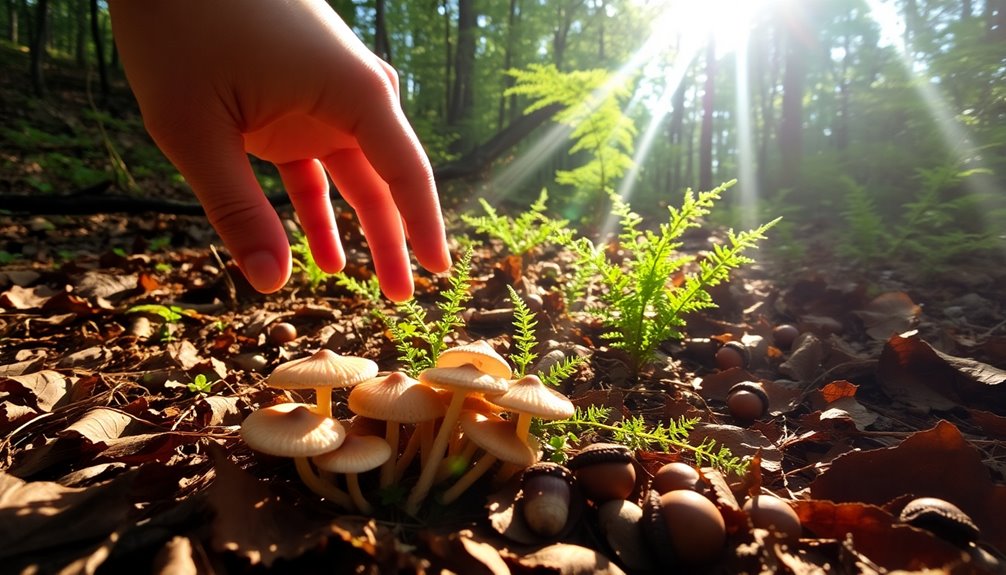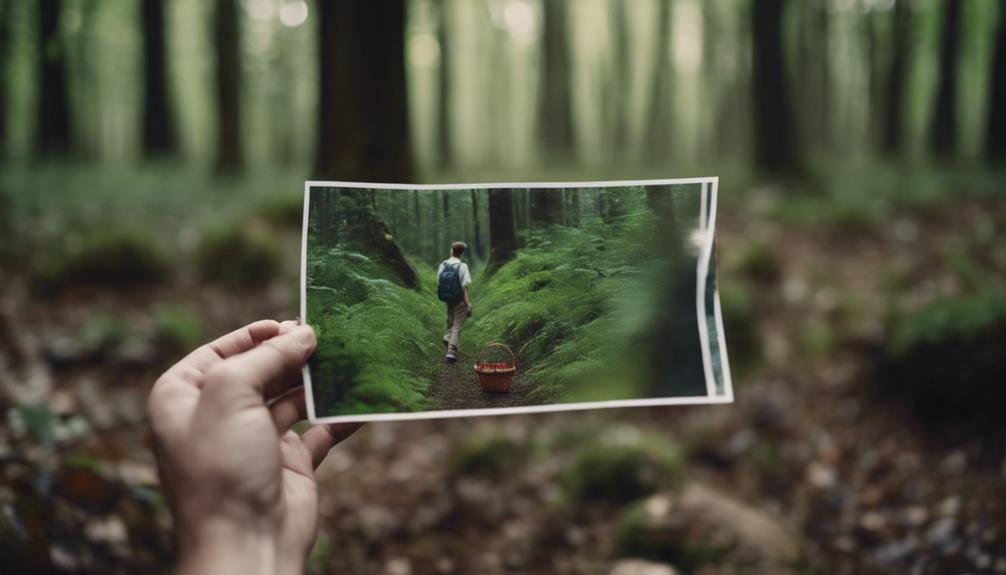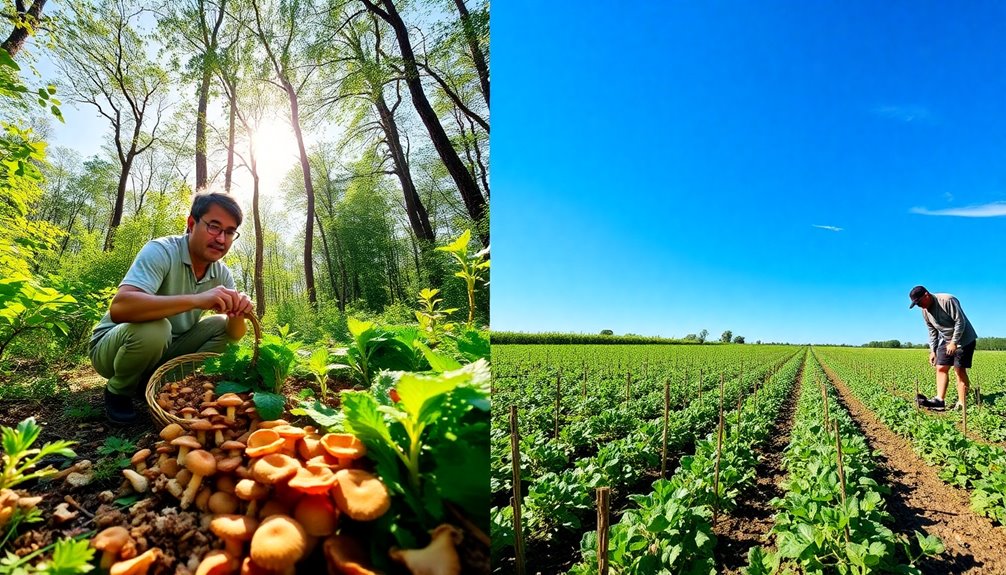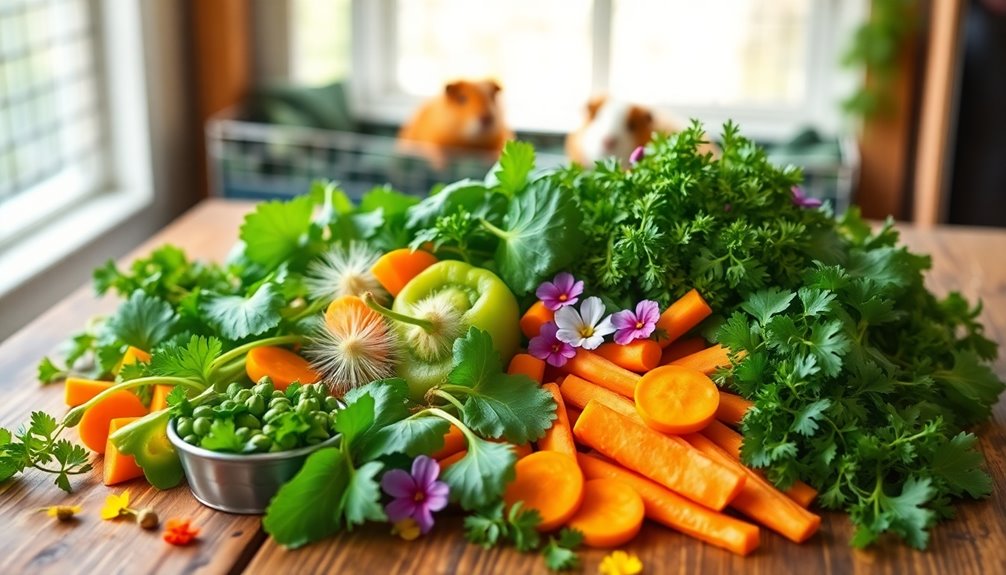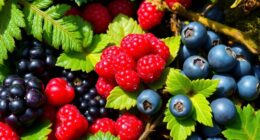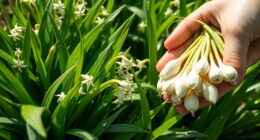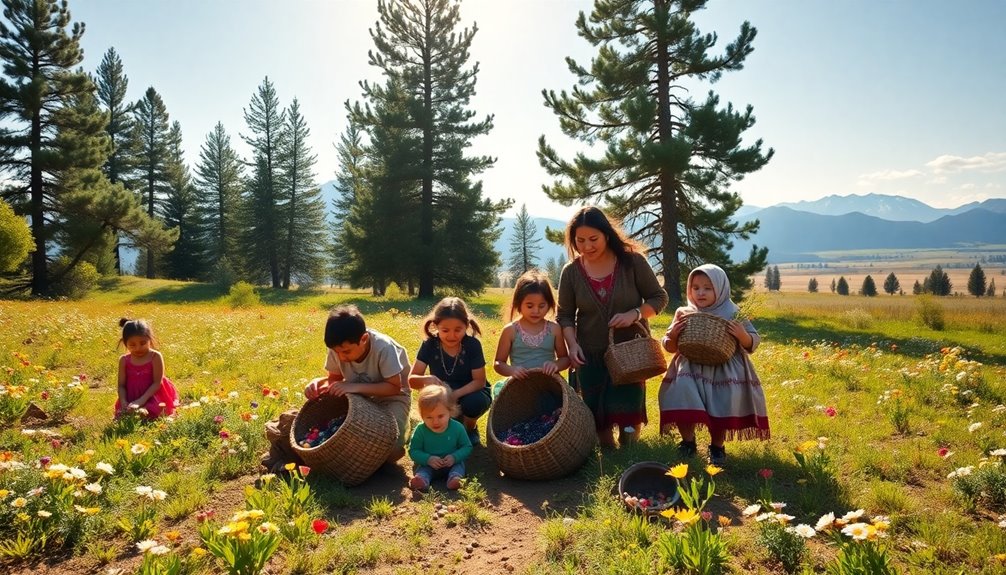Yes, "forage" does mean to search, but it specifically refers to searching for food. This term involves various actions like browsing, grazing, and scrounging for wild edibles or animals. Foraging is about more than just seeking—it's a practice rooted in cultural traditions and can even find its place in urban environments. It's important for both human communities and wildlife, enhancing nutrition and fostering sustainability. So, while "forage" is a type of search, it carries rich meanings that connect with nature and local ecosystems. There's much more to uncover about its significance and practices!
Key Takeaways
- "Forage" primarily means to search for food, emphasizing the act of finding wild edibles or animals.
- It serves as both a verb for the action of searching and a noun for food items collected.
- The term is more specific than "search," focusing on food-related contexts and behaviors.
- Foraging behavior varies among species, influenced by habitat and food availability.
- Urban foraging techniques highlight the modern relevance of searching for food in city environments.
Understanding the Definition of Forage
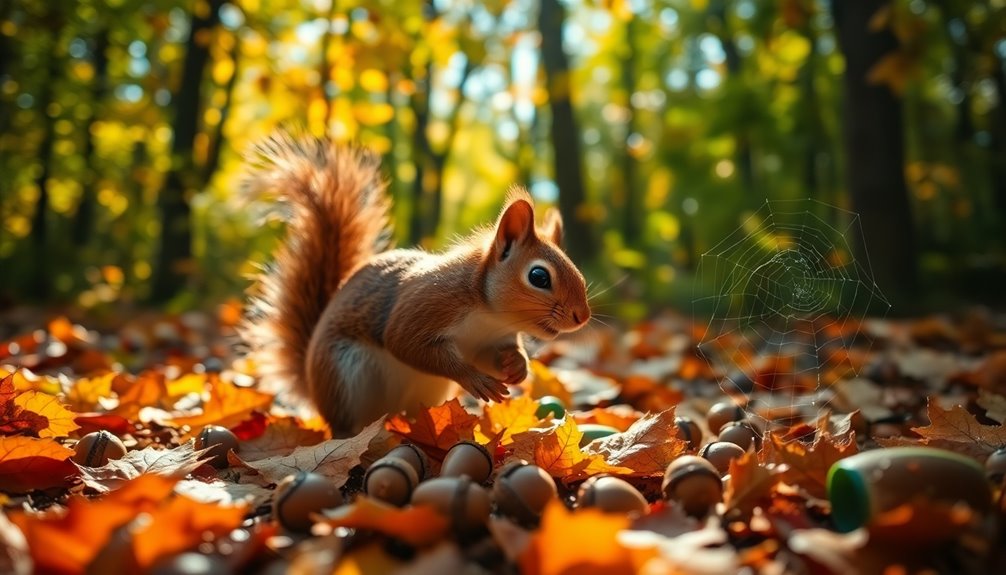
When you think about foraging, it's all about the act of searching for food—whether it's animals in the wild or humans looking for wild edibles. The term "forage" captures this essence perfectly. It's not just about the end goal of finding something to eat; it also encompasses the various methods involved in searching for provisions, including browsing, grazing, and scrounging in diverse environments.
Foraging is essential for many animal species, especially in natural habitats where food availability can change with the seasons. These creatures rely on their ability to forage effectively to survive.
But foraging isn't limited to animals. Humans, too, engage in this age-old practice, gathering food from nature and connecting with their environment. This aspect of foraging highlights its ecological and cultural significance, making it a shared endeavor across species. In regions like Wisconsin's Wild Bounty, foraging has become a popular activity, fostering community awareness of local flora.
The word "forage" serves both as a verb and a noun, indicating the action of searching as well as the food items being sought after. Understanding this definition allows you to appreciate the importance of foraging in both the animal kingdom and human culture.
Foraging Behavior in Animals
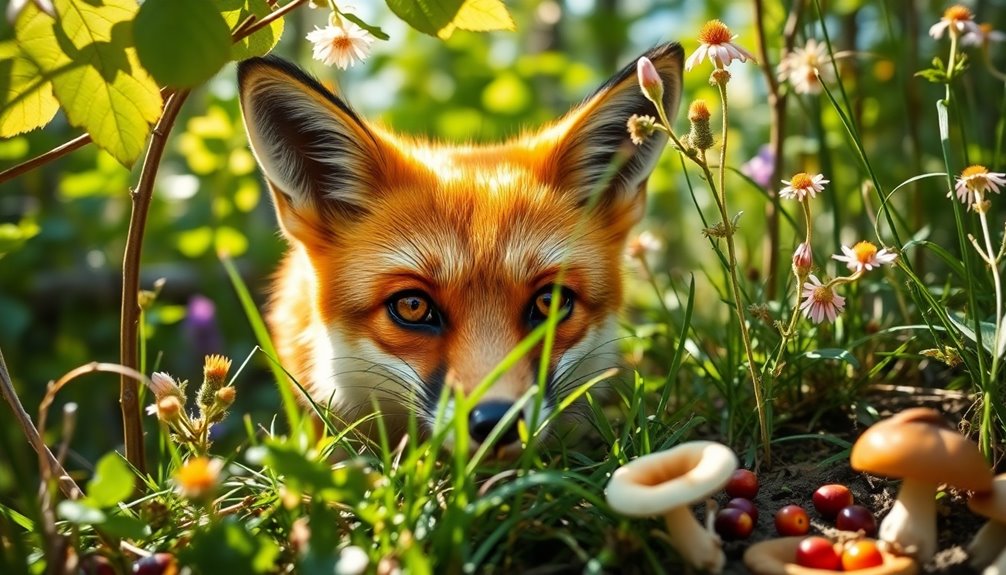
Foraging behavior in animals plays an essential role in their survival and varies markedly across species. For instance, while deer primarily graze on grasses and leaves, bears have a more diverse diet, foraging for fruits, insects, and small mammals.
These distinct foraging behaviors are heavily influenced by factors like habitat type, food availability, and seasonal changes. You'll notice how these elements dictate the movement patterns and feeding habits of different animals.
Social species, such as ants and wolves, often demonstrate cooperative foraging behaviors. By working together, these animals forage more effectively, enhancing their ability to locate and capture food.
Additionally, many animals have specialized adaptations that aid in foraging. For example, the giraffe's long neck allows it to reach high foliage, while dogs possess a keen sense of smell to locate buried food.
Ultimately, the way animals forage is essential for their survival. It directly impacts their nutrition and energy intake, which are critical for growth, reproduction, and overall health. Understanding these behaviors can also provide insights into the well-being of animal populations and their ecosystems.
Understanding these behaviors helps you appreciate the intricate balance of ecosystems and the importance of each species within them.
Human Foraging Practices
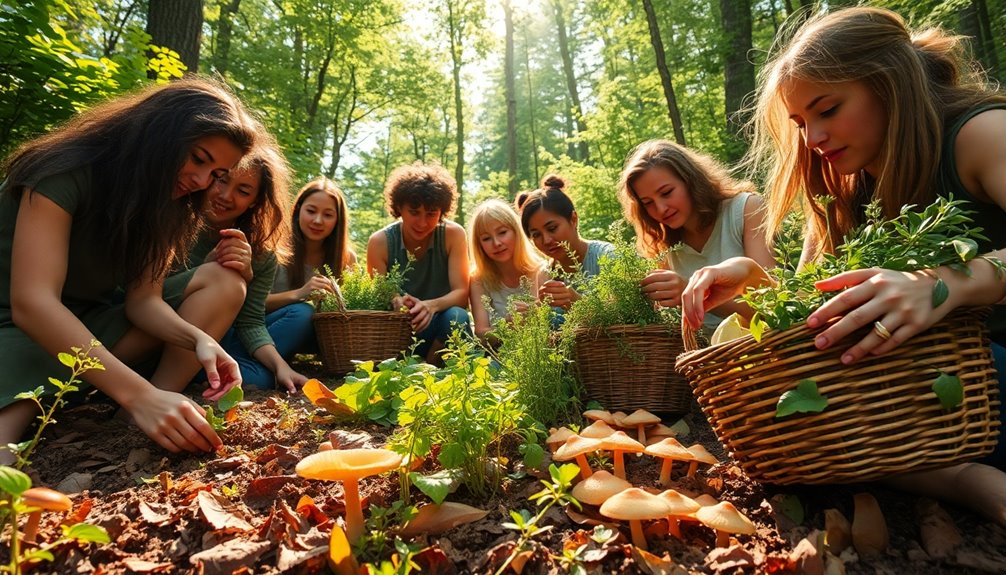
You might be surprised to learn that urban foraging techniques are becoming increasingly popular, allowing you to gather wild food even in city settings. By connecting with cultural foraging traditions, you can tap into a wealth of knowledge about edible plants and mushrooms passed down through generations. This exploration not only enriches your understanding of local ecosystems but also supports sustainable practices in your community. Additionally, understanding tree relationships is vital for successful mushroom foraging in urban environments, as different trees often provide habitat and nutrients that influence foraging patterns.
Urban Foraging Techniques
Although urban environments may seem devoid of wild food sources, many hidden gems await discovery in city parks and green spaces. Urban foraging involves searching for food like edible plants, mushrooms, and fruits from trees. It promotes local food sustainability and fosters a deeper connection to nature. Engaging in foraging can also introduce you to survival gear essentials that enhance your outdoor experiences. Additionally, understanding safe food sources is crucial for avoiding potential health risks while foraging. Mastering the identification of local plants can significantly improve your foraging success, especially when you focus on edible plants that thrive in urban areas. Furthermore, applying risk management strategies can help you navigate any challenges you may encounter while foraging.
To get started, familiarize yourself with local edible species and safe foraging techniques. Many cities offer community programs and workshops that can enhance your knowledge and skills.
When you're out searching for food, remember to explore public parks, vacant lots, and other green spaces, but always check local regulations regarding foraging in these areas.
Safety is essential; avoid places near roads or industrial sites to steer clear of potential contamination.
Make it a fun activity by inviting friends or family to join you, turning the hunt into a shared experience that encourages physical activity and community engagement. Additionally, participating in urban foraging can contribute to sustainable agriculture practices that enhance local biodiversity and promote environmental health.
Cultural Foraging Traditions
Cultural foraging traditions showcase the rich relationship humans have with their environment, reflecting centuries of knowledge passed down through generations.
These practices involve gathering wild edible plants, mushrooms, and berries, each region offering unique species based on local biodiversity. Whether you're in a rural or urban setting, understanding these traditions can deepen your connection to nature.
Here are three key aspects of cultural foraging traditions:
- Indigenous Knowledge: Many indigenous peoples possess extensive knowledge of local ecosystems. They use sustainable foraging techniques to harvest food sources, ensuring that nature can replenish itself.
- Seasonal Awareness: Foraging practices are often seasonal, meaning you'll find different edible species depending on the time of year. This not only helps you eat fresh but also fosters a deeper appreciation for local flora.
- Community Engagement: In urban areas, foraging's popularity has surged, with workshops teaching safe and ethical methods for foraging for mushrooms and other wild foods.
This encourages sustainable practices within communities, enhancing your overall connection to the environment.
Economic and Environmental Importance

When you consider forage management, you're not just boosting livestock health; you're also making a significant impact on your farm's profitability.
Sustainable practices can enhance soil quality and reduce erosion, creating a healthier environment for both agriculture and the ecosystem.
Sustainable Forage Management Practices
Sustainable forage management practices play an essential role in both economic viability and environmental stewardship in agriculture. By implementing these practices, you can enhance soil health, promote biodiversity, and improve the nutritional quality of forage for livestock.
Here are three key benefits you'll experience:
- Improved Soil Structure: Using cover crops and diverse plant species enhances soil fertility and reduces erosion, which is vital for maintaining productive land.
- Lower Feed Costs: Effective forage management optimizes high-quality forage growth, directly influencing livestock weight gain and milk production, ultimately reducing your feed expenses.
- Environmental Health: Sustainable forage management practices greatly cut down the need for synthetic fertilizers and pesticides, leading to less pollution and better ecosystem health.
Economic Benefits of Foraging
Foraging offers a unique blend of economic and environmental benefits that can greatly enhance your lifestyle. By engaging in the act of searching for wild edibles, you can considerably reduce your grocery bills and increase food security. Imagine walking through a local forest or park, collecting free or low-cost food sources that nourish both your body and wallet.
Local foraging markets also play an essential role in stimulating community economies. They create opportunities for small-scale vendors and promote local biodiversity, ensuring that your area thrives economically while preserving its natural beauty. Additionally, foraging can contribute to the economic benefits seen in renewable energy sectors, mirroring the way diverse ecosystems support job creation and local growth. This aligns with the increasing focus on sustainability within global economic development.
Furthermore, sustainable foraging practices help conserve ecosystems, which supports industries like tourism and recreation—areas that rely on healthy landscapes and diverse wildlife. Educational toys, such as STEM toys, can enhance children's understanding of ecosystems and biodiversity through play.
As consumer preferences shift toward organic and sustainably sourced products, the global foraging market continues to grow, reflecting this demand.
Additionally, foraging helps reduce food waste by encouraging the use of wild and underutilized edible plants that conventional agriculture often overlooks.
Cultural References to Foraging
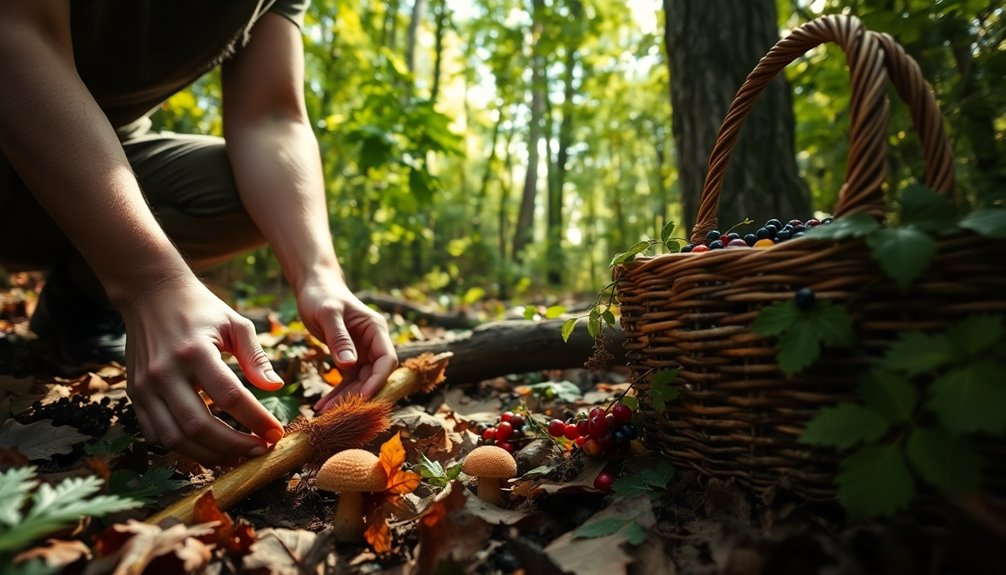
Throughout history, cultural references to foraging have shaped our understanding of survival and the human experience. Foraging isn't just about gathering food; it's a powerful theme in literature and folklore that reflects our connection to nature and resilience.
Here are three notable examples:
- Dystopian Narratives: In "The Hunger Games," characters search for food in a harsh environment, emphasizing their struggle for survival and resourcefulness amidst oppression.
- Animal Instincts: In "The One and Only Ivan," foraging symbolizes the quest for freedom and self-determination, showcasing how innate instincts drive both animals and humans.
- Folklore Journeys: Many myths feature characters who undertake foraging quests, representing the age-old human journey towards sustenance and understanding of the natural world.
These cultural references reveal that foraging has deeper meanings beyond mere food gathering. It embodies our survival instincts, the fight for freedom, and the enduring bond between humanity and nature.
Even today, communities continue to practice foraging, preserving traditional knowledge while connecting with their roots. Through these narratives, you can appreciate how foraging enriches our cultural landscape.
Vocabulary and Linguistic Insights
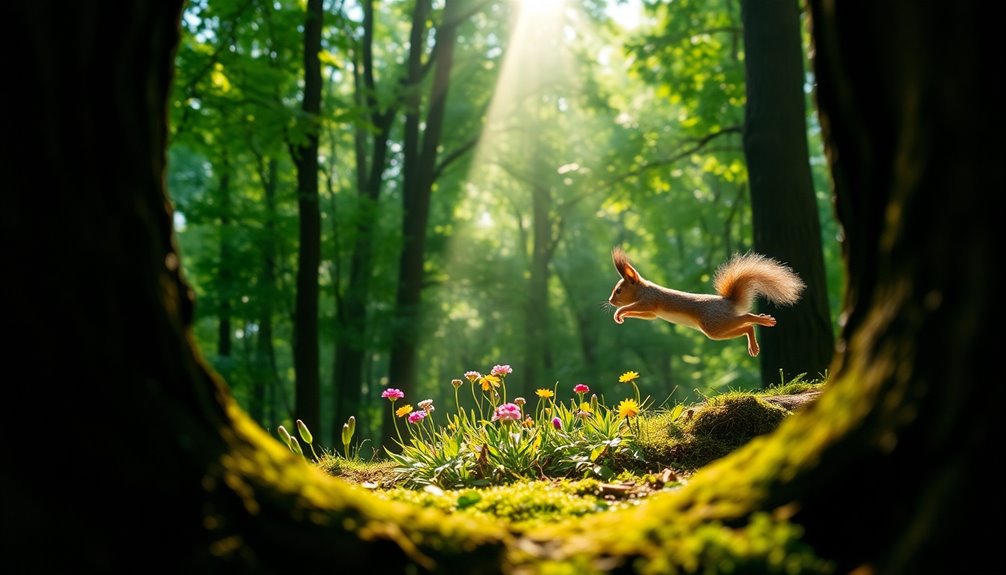
When you explore the term "forage," you'll find it holds significant meaning in both linguistic and practical contexts. The word functions as both a noun and a verb. As a noun, "forage" refers to food for animals, while as a verb, it means to actively search for provisions. This duality enriches its application in various fields, especially agriculture and ecology.
When you consider its use as an intransitive verb, "forage" highlights the act of wandering or rummaging for food. This specific nuance sets it apart from broader terms like "search," which lack that focused connotation. Additionally, you might notice that pronunciation varies slightly between American (/ˈfɔrɪdʒ/) and British English, showcasing regional linguistic diversity.
Forage-related vocabulary is essential for understanding topics related to animal husbandry and food gathering. Educational resources often include "forage" in vocabulary lists, aiding learners in grasping the language surrounding these important concepts.
Frequently Asked Questions
Does Forage Mean Search?
Yes, "forage" does mean to search, particularly for food or resources.
When you forage, you actively look for items that fulfill your needs, whether that's edible plants or materials for a project.
This searching behavior can stem from necessity, especially in challenging situations where supplies are low.
You might find yourself adapting your foraging techniques based on what's available and the environment around you, making it a dynamic and essential skill.
What Is the Meaning of the Word Forage?
When you're in a pinch, you might need to forage for what you can find. The word "forage" means actively searching for food or provisions.
It's what animals do in the wild, and it can also refer to humans gathering wild edibles. Beyond food, foraging can involve collecting various resources like firewood.
Fundamentally, it's about seeking out what's needed to survive or thrive in a given environment.
What Is Forage Explained?
Forage refers to both the food available for animals and the act of searching for food or resources.
When you think of foraging, you might picture animals scavenging in nature or even yourself picking wild berries or mushrooms.
It's crucial for survival, influencing diets and movement patterns.
Additionally, good forage directly affects livestock health, making its management essential in agriculture.
What Is the Closest Meaning of Forage?
Did you know that nearly 2 billion people globally rely on foraging for part of their diet?
The closest meaning of "forage" is to actively search for food or resources. It's not just about animals hunting for sustenance in nature; you might also think of humans gathering wild edibles.
When you forage, you're engaging in a purposeful quest for nourishment, showcasing the instinctual drive to seek out what's necessary for survival.
Conclusion
So, the next time you hear "forage," don't just think of searching for snacks like a modern-day treasure hunter in a grocery store. This term is rich with meaning, encompassing both animal behavior and human practices. Understanding foraging connects you to nature, our ancestors, and even today's sustainability efforts. It's more than just a quest for food; it's about survival, culture, and the environment. Embrace the true essence of foraging—it's a journey worth taking!

